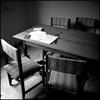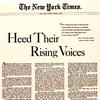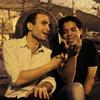Brooke Gladstone appears in the following:
How Much Oil Really Spilled?
Friday, March 28, 2014
On the 25th anniversary of the Exxon Valdez oil spill in Southwest Alaska, the media reported, as they have since the disaster happened, that the amount of oil spilled was 11 million gallons. In 2010, Brooke spoke with Riki Ott - a marine toxicologist and author - who explained that the 11 million number is in fact a disputed figure the media have incorrectly adopted.
Taking Healthcare Literally
Friday, March 28, 2014
Bob speaks with Yurina Melara who covers public health for the Los Angeles-based La Opinion, the largest Spanish language daily in the US. She says that telling the 38 million Spanish-speaking Americans about Obamacare is only half the battle. The other half is making sure they understand what it is...beginning with the literal translation of “health care.”
Which Public Radio Hosts Are Our Hosts?
Friday, March 28, 2014
Brooke and Bob share their results from a number of quizzes - including Which Public Radio Host Are You? - and discuss what (if anything) they've learned about themselves and this viral sensation.
By the way, we have our own quiz, too! Find out which 19th century media baron you are here.
The World According to Google Maps
Friday, March 28, 2014
News and the Novel
Friday, March 21, 2014
For the past four years novelist David Bezmozgis has been writing a book set in Crimea. His forthcoming novel, The Betrayers, was intended to be set in August 2014, but that isn't possible now. Brooke speaks with Bezmozgis, as he sits between manuscript lock and book release, about trying to adjust his fictional story set in a fraught, factual place.
So Many Keys
Friday, March 21, 2014
Four times a year, members of the Internet Corporation for Assigned Names and Numbers, or ICAAN, take part in an elaborate ceremony (iris scanners!) designed to assure the world that the organization is doing its best to keep the web connected and safe. Brooke explains the meeting of the keyholders, with insight from Guardian reporter James Ball, who attended one of the ceremonies last month.
Russian Media Tropes, At Home and Abroad
Friday, March 21, 2014
Michael McFaul has just returned to Stanford University after a couple of tumultuous years in Moscow as the U.S. ambassador to Russia. He talks with Brooke about the tropes he saw in the Russian media while he was there, and what he's noticed in the American media since he's been back.
Stepping into the Light
Friday, March 14, 2014
As we’ve previously reported, US Customs and Border Protection, under the aegis of the Department of Homeland Security, is one of the least transparent agencies in the country. But late last week, sparked by a leak of a review done by the Police Executive Research Forum, CBP shone a little light on its processes. Brooke speaks to Brian Bennett, National Security Correspondent for the Los Angeles Times and the Chicago Tribune, who was the recipient of that initial leaked report.
The Re-Birth of the First Amendment
Friday, March 14, 2014
Fifty years ago, the Supreme Court made a decision in the case New York Times v Sullivan that would forever alter the way journalists practiced journalism. Brooke speaks with Andrew Cohen, contributing editor at The Atlantic and fellow at the Brennan Center for Justice, about the decision's impact on the First Amendment.
Supreme Court audio courtesy of Oyez®, a multimedia judicial archive at IIT Chicago-Kent College of Law
FOIA's Report Card
Friday, March 14, 2014
The Freedom of Information Act has been around since 1966, but according to a new report card, federal agencies haven’t yet mastered the art of disclosing. Brooke speaks with Sean Moulton of the Center for Effective government, which just released The Access to Information Scorecard 2014, a sobering look at government transparency.
Device Searches at the Border
Friday, February 28, 2014
The border is a legal gray area where the same constitutional protections one expects inside the country don't necessarily apply. When graduate student Pascal Abidor had his electronic devices searched and seized at the border back in 2010, he filed lawsuit against the federal government. But in December, a federal judge upheld the government's right to search travelers' devices at the border without a warrant. Brooke speaks with Pascal about his experience at the border and the lawsuit.
My Detainment Story or: How I Learned To Stop Feeling Safe In My Own Country and Hate Border Agents
Friday, February 28, 2014
Back in September, OTM producer Sarah Abdurrahman, her family, and her friends were detained for hours by US Customs and Border Protection on their way home from Canada. Everyone being held was a US citizen, and no one received an explanation. Sarah tells the story of their detainment, and her difficulty getting any answers from one of the least transparent agencies in the country.
Shedding Light on DHS
Friday, February 28, 2014
Getting information from Customs and Border Protection and the Department of Homeland Security is not just difficult for journalists and private citizens—even members of Congress have a hard time getting answers. Brooke speaks with Representative Beto O'Rourke of Texas' 16th District about the oversight needed to ensure more transparency from DHS.
And a crowdsourcing project to Shed Light on DHS!
Capturing Egypt’s Neverending Story
Friday, February 21, 2014
The Oscar-nominated documentary “The Square” turns a lens on the Egyptian revolution and its aftermath through the eyes of three very different men whose lives intersected in Tahrir Square in 2011. Brooke talks with director Jehane Noujaim and producer Karim Amer about capturing Egypt’s unfolding narrative on camera. Audio courtesy of the Paley Center for Media.
Cable Barons
Friday, February 21, 2014
The proposed merger of Comcast and Time Warner Cable could do more than mess with our TV and Internet bills. It could shape how many of us experience the flow of ideas. Brooke talks with communications law scholar Susan P. Crawford about the potential impact of this mega-merger on the information we access through Comcast's digital pipe.
"Winter Chill" for Russian Media
Friday, February 07, 2014
As the global spotlight fixes on Sochi this weekend, the Russian government is crushing dissent...and there’s a lot of it. As the Committee to Protect Journalists notes in a new report, people there have suffered long-lasting power outages, environmental damage, evictions, corruption, and widespread violation of labor laws. But local news organizations are silent on these issues, instead functioning as public relations agencies for the government. Brooke talks with Nina Ognianova about the stories that aren't being told in the Russian media.
Knox Found Guilty...Again
Friday, February 07, 2014
Last week an Italian court found Amanda Knox guilty of the murder of British student Meredith Kercher. Again. Knox was first found guilty in 2009. In the almost seven years since this story broke, an industry of books, websites and made-for-tv movies has emerge to exploit - or investigate - the case of Amanda Knox. Brooke speaks to author Nina Burleigh, who wrote one of the best accounts of the Knox case, “The Fatal Gift of Beauty, The Trials of Amanda Knox."
A Rabble-Rouser On Jeopardy
Friday, February 07, 2014
The Future of Oral History Projects
Friday, January 31, 2014
Brooke speaks with Jack Dunn, the Director of the Boston College News and Public Affairs office about what Boston College has done to protect the tapes from the Belfast Project and the future of academic oral history projects.



















